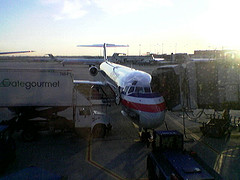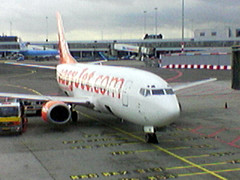 Every time a new phone gets announced, the spec sheet is pounced on, and people ask if the frequencies are triband or quad band. The reason is that different networks around the world work on different frequencies, even if they all conform to the GSM specifications. Many years ago, a dual band phone was the thing to look for in the UK, as two networks - Vodafone and (the recently purchased by Telefonica) O2 worked on 900Mhz, while Orange and T-Mobile were on 1800Mhz. Other countries (typically America and parts of Asia) also worked with the 1900Mhz, and we're now seeing the 850 Mhz frequency being used. In theory, if your phone supports the right frequencies, you can use it on business trips and holidays abroad.
Every time a new phone gets announced, the spec sheet is pounced on, and people ask if the frequencies are triband or quad band. The reason is that different networks around the world work on different frequencies, even if they all conform to the GSM specifications. Many years ago, a dual band phone was the thing to look for in the UK, as two networks - Vodafone and (the recently purchased by Telefonica) O2 worked on 900Mhz, while Orange and T-Mobile were on 1800Mhz. Other countries (typically America and parts of Asia) also worked with the 1900Mhz, and we're now seeing the 850 Mhz frequency being used. In theory, if your phone supports the right frequencies, you can use it on business trips and holidays abroad.
In the last year I've made 6 foreign trips on business and had a mental checklist for my mobile phone needs. If you're planning a trip abroad, or need a quick refresher, then here are some things to look out for before you leave and while you're at your destination.
Roaming Agreements and Operator Locks
First thing is that you're going to need network coverage where you'll be, and that means two things need to be in place from the network you'll be using when you're away. The first is that it runs on a similar frequency to your phone, and the second is that your home network (in my case Orange) has a roamng agreement with the network you visit. Without this you won't be allowed to "log on" to the network. Both of these criteria can be checked by calling the appropriate Operator Services before you leave.
It's worth remembering that emergency calls (such as 911, 112 or 999) bypass the permissions system. If you call emergency services and your phone can find a network, you'll be put through.
Roaming can be pricey, and in most cases you need to specifically ask your operator to enable your phone for roaming. Because of the potential costs involved, the amount of time you've been with the network will be taken into consideration and you might be asked to place a deposit to cover these costs.
 SIM Updates
SIM Updates
Although you can log on to other networks when you are away, you will be unable to recieve any SIM updates when roaming. When you call the network above to check any details, make sure that any SIM updates that need to be applied are done so a few days before you leave. Don't try and set up anything at the departure gate. If you use Pay as you Go, find out if you can buy credits while roaming, otherwise make sure you have enough loaded on your SIM.
Charging Your Phone
Unless it's a day trip, you'll need to take your AC charger for your phone to make it through the trip. You'll probably need a plug adaptor so it can fit the wall sockets. When I travel, I take a small 4-bar extension cable and use the plug adaptor on that. With a phone, BT handsfree kit, laptop and minidisc to charge, it's much easier than buying 6 adaptors which won't all fit in the one accessible plug socket in the hotel.
Call Costs (Incoming and Outgoing)
Roaming is pricey. There's no two ways about it. Check with your network operator the exact cost, but it's almost guaranteed that your free minutes and off peak hours will be ignored, and you'll get a very high per minute rate to work with. This will be for incoming calls as well as outgoing calls. So if your Mum calls you for a thirty minute chat, she'll pay the same as if you were in the UK, and then you'll pay something similar to the roaming rate above to recieve the call. Talk is not cheap, so I'd suggest get the information over as fast as possible and then hang up.
SMS Bundles will probably not be available either. On a recent trip to the USA my SMS bill was 50p + tax per text. Check this cost as well.
You can deactivate your answering machine so people will not be able to leave a message (unless you really, really want to pay the roaming chage to pick up the messages). I'd suggest a greeting such as "I'm in Canada right now, I'll be back on (whenever) . If it's urgent please call again, call my office or email me."
 Getting Online
Getting Online
Speaking of email and Internet access (after all, we're in the age of the Internet-enabled smartphone) it is possible to log onto your GPRS network while you're away - but if you thought your per-minute rate for voice was scary, you ain't seen nothing yet. GPRS per Megabyte is astoundingly high when roaming. My advice here would be simply "don't bother." Horror stories of thousands of pounds worth on GPRS for a few days are easily found.
If you must, your existing GPRS settings will work abroad. Switch off the images in your web browser, and if you can restrict your email client to picking up headers first, then do so. You might want to work with your server's email application so they only send high priority emails to a second email address (such as ewanistravelling@domain.com) to try and reduce the amount of data you'll need to pick up.
Travelling abroad is where phones with built in Wi-Fi come into their own. At the moment of writing, this is just the Nokia 9500, but as both the Sony Ericsson P990 and the latest Nokia E and N-Series phones (N80, N91 and N92) become publicly available these units are also going to be great choices for the traveller who needs to get online. Wi-Fi access via hotspots is commonly free or only a few pounds per hour.
Summary
Roaming is possible, and you'll definitely want it set up for any trips you make. Whether you actually use it is a different matter. If you do, make sure you know exactly what you'll be charged and budget accordingly.
